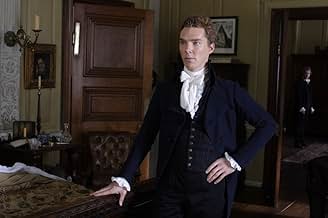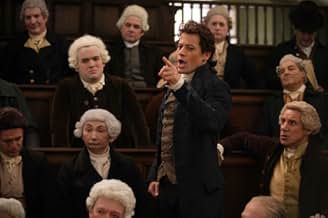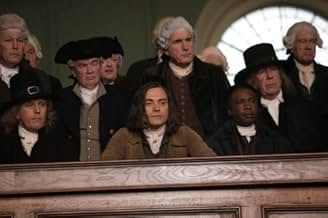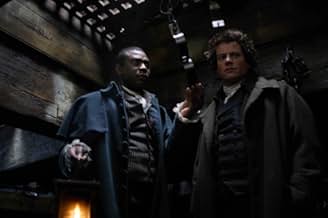IMDb-BEWERTUNG
7,4/10
26.160
IHRE BEWERTUNG
Füge eine Handlung in deiner Sprache hinzuThe idealist William Wilberforce maneuvers his way through Parliament, endeavoring to end the British transatlantic slave trade.The idealist William Wilberforce maneuvers his way through Parliament, endeavoring to end the British transatlantic slave trade.The idealist William Wilberforce maneuvers his way through Parliament, endeavoring to end the British transatlantic slave trade.
- Auszeichnungen
- 3 Gewinne & 6 Nominierungen insgesamt
Ciarán Hinds
- Lord Tarleton
- (as Ciaran Hinds)
Empfohlene Bewertungen
I was well impressed with Amazing Grace; the period was superbly captured, and the interplay of the main action (the fight of William Wilberforce to abolish British slavery) with the other great events of his time (the American and French revolutions) was well presented. The film stirs the emotions but informs the mind. Ioan Gruffudd as Wilberforce is believable and depicts the tenacious Yorkshire MP with both his bodily weakness and great spirit well. Albert Finney as John Newton renders a moving portrayal of the ex-slave trader turned evangelical minister who influences Wilberforce's decision to remain in politics rather than entering the ministry of the church. Benedict Cumberbatch gives a strong representation of William Pitt, and the overall impression of the film is one whose history has been well researched. Well worth a viewing.
This is a lovely, moving and intelligent film. I did not detect any notably weak performances among a remarkable cast. The older actors though, Michael Gambon and Albert Finney, were shameless scene stealers, but one can hardly fault them for their excellence. There were many things to like about this film. It was gorgeous to look at, brilliantly capturing the look and sound of a sumptuous age. The pacing and editing were fine, though the device using flashbacks for most of the film occasionally led to a moments confusion about when a scene was supposed to be taking place. And the story itself is quite inspirational. A note for my Canadian readers and the Canadians who attended the TIFF screenings. The film mostly covered the struggle to outlaw slavery in Britain itself, though they did touch on Wilberforce's efforts to have it outlawed throughout the British Empire. This continued in the years after the conclusion of the film, and a Bill to do just that was passed in 1833, a month after Wilberforce died. So the film we watched was very much about our own history, and the story of the abolition of slavery in Britain directly affected the eventual abolition of slavery in Canada.
10tollini
I saw this film on October 10th, 2006 in Indianapolis. I am one of the judges for the Heartland Film Festival's Truly Moving Picture Award. A Truly Moving Picture "
explores the human journey by artistically expressing hope and respect for the positive values of life." Heartland gave that award to this film.
This is an inspiring story based on a legendary historical British Member of Parliament, William Wilberforce. During the late 18th century and early 19th century, a very young Wilberforce is elected to Parliament and over the course of several decades leads the fight to ban slavery.
Today this seems like an easy, obvious and intuitive decision. But this was not so 200 years ago. The film clearly explains the entrenched economic motives and the political motives for slavery. Wilberforce starts out as almost a force of one and slowly builds abolitionist momentum by brilliant oratory, political maneuvers, and appealing to his fellow man's better nature.
Ioan Gruffudd is totally believable in explaining to the audience the complexity and heroism of Wilberforce. Wilberforce over the course of his life is sickly and strong, religious and worldly, naive and romantic, and idealistic and practical.
During the course of this mostly political story, we get to see the immense cruelty shown to the captured Africans turned into slaves. We are shown the slave sailing ships where the captured are treated inhumanely and die of starvation, neglect, disease, and filth. Man's inhumanity to man was never worse.
Wilberforce is a great man of history even though mostly forgotten today. He respected his fellow man regardless of their station in life. He was always willing to sacrifice his life and health to help others. And his compassion and spirit was always masked by his humility. He is a hero for all ages.
This is a period piece and you are lost in it because of the attention to detail. The sets, art direction, and costumes allow you to totally suspend disbelief and be moved by the story.
FYI There is a Truly Moving Pictures web site where there is a listing of past Truly Moving Picture Award winners that are now either at the theater or available on video.
This is an inspiring story based on a legendary historical British Member of Parliament, William Wilberforce. During the late 18th century and early 19th century, a very young Wilberforce is elected to Parliament and over the course of several decades leads the fight to ban slavery.
Today this seems like an easy, obvious and intuitive decision. But this was not so 200 years ago. The film clearly explains the entrenched economic motives and the political motives for slavery. Wilberforce starts out as almost a force of one and slowly builds abolitionist momentum by brilliant oratory, political maneuvers, and appealing to his fellow man's better nature.
Ioan Gruffudd is totally believable in explaining to the audience the complexity and heroism of Wilberforce. Wilberforce over the course of his life is sickly and strong, religious and worldly, naive and romantic, and idealistic and practical.
During the course of this mostly political story, we get to see the immense cruelty shown to the captured Africans turned into slaves. We are shown the slave sailing ships where the captured are treated inhumanely and die of starvation, neglect, disease, and filth. Man's inhumanity to man was never worse.
Wilberforce is a great man of history even though mostly forgotten today. He respected his fellow man regardless of their station in life. He was always willing to sacrifice his life and health to help others. And his compassion and spirit was always masked by his humility. He is a hero for all ages.
This is a period piece and you are lost in it because of the attention to detail. The sets, art direction, and costumes allow you to totally suspend disbelief and be moved by the story.
FYI There is a Truly Moving Pictures web site where there is a listing of past Truly Moving Picture Award winners that are now either at the theater or available on video.
I had the pleasure this past week of seeing a pre-screening outside of Washington, D.C. of the movie Amazing Grace, starring Reed Richards...err...Ioan Gruffudd as William Wilberforce the famous British Christian politician that helped end the slave trade in Great Britain in the early 18th Century. The movie progresses through Wilberforce's life from about the time he begins his crusade against the slave trade in Parliament in his early 20's to the time it is eventually abolished. Everything in between is composed of all the hardships, victories, and relationships he goes through in the meantime. At some points the story can be a bit yawn inducing, but the film consistently seems to add just the right amount of humor or political intrigue to keep it afloat (more on the pacing below). There is a love interest Barbara, played by the quite attractive and dynamic Romola Garai, who keeps Mr. Fantastic...err...Wilberforce on track and encouraged. You get the feeling he would've never made it through the hard times without her (which is probably the case for most successful men as they say). The film does delve into evils of the slave trade, but it doesn't focus specifically on it, much like Amistad did focus on it. It seems to keep the main goal in mind, abolishing that heinous evil. This gives the film a "glass half full" feeling instead of a "glass half empty" one. You find yourself cheering for the good guys instead of seeking the heads of the bad ones.
You may be thinking they should've just called this film "Amistad: The Prequel", but that would do it a great disservice. Where Amistad succeeded in many ways such as exposing the horror of the slave trade in much more visual and visceral detail and containing great acting by Djimon Hounsou and Anthony Hopkins, I feel you ultimately left the theater not really feeling much better about anything. In fact, I'd say you may have left if feeling worse, maybe even shameful and/or guilty. Amazing Grace doesn't feel like that. In fact, it's not even really a "feel good" movie; it transcends that status. It's really a "do good" movie. You almost feel personal empowerment from the story, like you want to go out and change some social injustice yourself! Sure, we don't all have the political clout of a William Wilberforce, but we do have a voice. And I think that's why Amazing Grace stands above previous "social injustice" films like it. It feels organic instead of static. It feels like it could apply to today instead of some time long forgotten. It also appeals to everyone; black, white, or whoever. One African-American in the audience mentioned how he was impressed and encouraged at how passionate these white men were for the plight of the slaves. You also realize that slavery wasn't just an American problem, it was a world problem; which further emphasized the fact that the social injustice we see today isn't just a "fill_in_the_blank" problem, it's a world problem.
I'm not knowledgeable enough to comment very much on the technical aspects of this film, but don't let the religious overtones fool you into thinking this is another technical mess like so many in the past. It is on par with any period film of its kind from Hollywood in almost every way; acting, set design, costume design, story, etc.
One thing I found a drawback to it was its pacing though. It starts off fairly tepid, and though it builds up, it seems to go through a cycle of building up and then falling back down again. This could ultimately be a good thing though, because if you can keep your focus throughout the film, you'll be in for a very powerful ending that evokes positive emotions you didn't think you had, and I think the cyclic nature of the film's progress enhances the fulfillment the ending provides. I also found the time period jumping around within the film to be a bit confusing at some points; like some scenes I didn't know if they were in the past or present.
The representative at the screening said the movie would be playing on about 850 screens nationwide on its opening weekend (Feb. 23). Though this is small compared to most major movies, it is a pretty good amount for a smaller movie like this. I recommend going to see it if you're interested in a movie with depth, passion, character, goodness, virtue, and victory. Does it entertain? Sure. But it seems to do a little more also. You can't say that about too many movies these days. You won't leave wishing you had that $8.50 back.
In case you're wondering about the title, John Newton, the composer of the famous hymn 'Amazing Grace', (played powerfully by Albert Finney), was a contemporary and friend of William Wilberforce. John Newton was also a reformed ex-slave trader.
You may be thinking they should've just called this film "Amistad: The Prequel", but that would do it a great disservice. Where Amistad succeeded in many ways such as exposing the horror of the slave trade in much more visual and visceral detail and containing great acting by Djimon Hounsou and Anthony Hopkins, I feel you ultimately left the theater not really feeling much better about anything. In fact, I'd say you may have left if feeling worse, maybe even shameful and/or guilty. Amazing Grace doesn't feel like that. In fact, it's not even really a "feel good" movie; it transcends that status. It's really a "do good" movie. You almost feel personal empowerment from the story, like you want to go out and change some social injustice yourself! Sure, we don't all have the political clout of a William Wilberforce, but we do have a voice. And I think that's why Amazing Grace stands above previous "social injustice" films like it. It feels organic instead of static. It feels like it could apply to today instead of some time long forgotten. It also appeals to everyone; black, white, or whoever. One African-American in the audience mentioned how he was impressed and encouraged at how passionate these white men were for the plight of the slaves. You also realize that slavery wasn't just an American problem, it was a world problem; which further emphasized the fact that the social injustice we see today isn't just a "fill_in_the_blank" problem, it's a world problem.
I'm not knowledgeable enough to comment very much on the technical aspects of this film, but don't let the religious overtones fool you into thinking this is another technical mess like so many in the past. It is on par with any period film of its kind from Hollywood in almost every way; acting, set design, costume design, story, etc.
One thing I found a drawback to it was its pacing though. It starts off fairly tepid, and though it builds up, it seems to go through a cycle of building up and then falling back down again. This could ultimately be a good thing though, because if you can keep your focus throughout the film, you'll be in for a very powerful ending that evokes positive emotions you didn't think you had, and I think the cyclic nature of the film's progress enhances the fulfillment the ending provides. I also found the time period jumping around within the film to be a bit confusing at some points; like some scenes I didn't know if they were in the past or present.
The representative at the screening said the movie would be playing on about 850 screens nationwide on its opening weekend (Feb. 23). Though this is small compared to most major movies, it is a pretty good amount for a smaller movie like this. I recommend going to see it if you're interested in a movie with depth, passion, character, goodness, virtue, and victory. Does it entertain? Sure. But it seems to do a little more also. You can't say that about too many movies these days. You won't leave wishing you had that $8.50 back.
In case you're wondering about the title, John Newton, the composer of the famous hymn 'Amazing Grace', (played powerfully by Albert Finney), was a contemporary and friend of William Wilberforce. John Newton was also a reformed ex-slave trader.
Most people probably have vaguely heard of William Wilberforce without knowing too much about his life. The power of his story, and the power of the central issue (the abolition of slavery), carries this movie that veers from artful to clumsy.
The movie can be confusing, as it moves back and forth between phases of Wilberforce's life. Often I found myself wondering for a few moments, "When is this?" Also, much of the political intrigue has to be inferred, since the backgrounds of the various players - particularly Wilberforce's adversaries - are not adequately explained.
However, the performances are quite good, some bordering on excellence. Some might argue that the villains are too simplistically presented, but on an issue like slavery, it is expected that the opposition would be completely unsympathetic (just as Nazis are rarely presented with any hint of sympathy).
I am sure the writers took some liberties with history. By the way, the tune we now associate with the hymn "Amazing Grace" did not become the melody for John Newton's famous lyrics until after Wilberforce's death.
I just watched this movie at a private screening for attendees of the National Prayer Breakfast in Washington, DC (clergy are a natural audience for this movie). The reception was favorable, but this was an audience for which the moralizing of the story would naturally resonate. I'm not sure it will attract a very broad audience - this is a movie that may well find its niche on DVD being shown in high school history classes and at church gatherings.
It is a nice, historical, period piece. It is (largely due to subject matter) reminiscent of "Amistad", with similar pacing.
Should you see it? It depends on whether you like this TYPE of movie. If this genre (historical drama) interests you, this is quite well-done. It might even inspire you to read more about Wilberforce. Go see it. If you are in search of movies that teach lessons about good values and perseverance in fighting for what's right, go see it.
But if you have no idea when the French Revolution occurred relative to our War of Independence, and if it doesn't come naturally to you to remember that the newborn U.S. was allied with France against Britain during that period - and if you don't care - this movie might not be your idea of a fun time.
If I were the producers, I would add one of those "scrolling text" historical introductions to the film before final release, though it is probably too late.
The movie can be confusing, as it moves back and forth between phases of Wilberforce's life. Often I found myself wondering for a few moments, "When is this?" Also, much of the political intrigue has to be inferred, since the backgrounds of the various players - particularly Wilberforce's adversaries - are not adequately explained.
However, the performances are quite good, some bordering on excellence. Some might argue that the villains are too simplistically presented, but on an issue like slavery, it is expected that the opposition would be completely unsympathetic (just as Nazis are rarely presented with any hint of sympathy).
I am sure the writers took some liberties with history. By the way, the tune we now associate with the hymn "Amazing Grace" did not become the melody for John Newton's famous lyrics until after Wilberforce's death.
I just watched this movie at a private screening for attendees of the National Prayer Breakfast in Washington, DC (clergy are a natural audience for this movie). The reception was favorable, but this was an audience for which the moralizing of the story would naturally resonate. I'm not sure it will attract a very broad audience - this is a movie that may well find its niche on DVD being shown in high school history classes and at church gatherings.
It is a nice, historical, period piece. It is (largely due to subject matter) reminiscent of "Amistad", with similar pacing.
Should you see it? It depends on whether you like this TYPE of movie. If this genre (historical drama) interests you, this is quite well-done. It might even inspire you to read more about Wilberforce. Go see it. If you are in search of movies that teach lessons about good values and perseverance in fighting for what's right, go see it.
But if you have no idea when the French Revolution occurred relative to our War of Independence, and if it doesn't come naturally to you to remember that the newborn U.S. was allied with France against Britain during that period - and if you don't care - this movie might not be your idea of a fun time.
If I were the producers, I would add one of those "scrolling text" historical introductions to the film before final release, though it is probably too late.
Wusstest du schon
- WissenswertesDuring the scene in which William Wilberforce (Ioan Gruffudd) sings "Amazing Grace" at the card house, the singing was performed live by Gruffudd. In the previous several takes, a playback had been used, but it is Gruffudd singing in the final film. Director Michael Apted had no idea whether or not Gruffudd could actually sing. Little did he know, Gruffudd is an accomplished soloist and choir singer. With a little practice, Gruffudd performed for the first time on-set while the cameras were rolling, all much to the surprise of the cast, crew, and director.
- PatzerThere were at least 3 grammar mistakes: several uses of "I" when "me" should have been used. Wilburforce also says "By who?" As a graduate of Cambridge, he would have said, "By whom?"
- Zitate
John Newton: Although my memory's fading, I remember two things very clearly. I'm a great sinner and Christ is a great Savior.
- VerbindungenFeatured in Tavis Smiley: Folge vom 23. Januar 2007 (2007)
Top-Auswahl
Melde dich zum Bewerten an und greife auf die Watchlist für personalisierte Empfehlungen zu.
Details
- Erscheinungsdatum
- Herkunftsländer
- Offizieller Standort
- Sprache
- Auch bekannt als
- Amazing Grace
- Drehorte
- Produktionsfirmen
- Weitere beteiligte Unternehmen bei IMDbPro anzeigen
Box Office
- Bruttoertrag in den USA und Kanada
- 21.250.683 $
- Eröffnungswochenende in den USA und in Kanada
- 4.305.000 $
- 25. Feb. 2007
- Weltweiter Bruttoertrag
- 32.120.360 $
- Laufzeit1 Stunde 58 Minuten
- Farbe
- Sound-Mix
- Seitenverhältnis
- 1.85 : 1
Zu dieser Seite beitragen
Bearbeitung vorschlagen oder fehlenden Inhalt hinzufügen

Oberste Lücke
By what name was Der Mann, der die Welt veränderte (2006) officially released in India in English?
Antwort






































